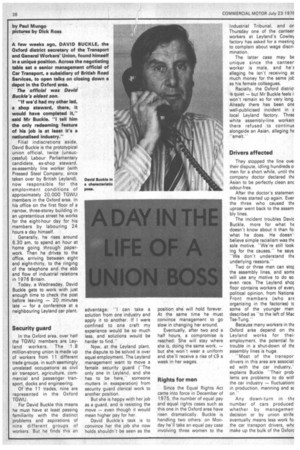A few weeks ago, DAVID BUCKLE, the Oxford district secretary
Page 40

If you've noticed an error in this article please click here to report it so we can fix it.
of the Transport and General Workers' Union, found himself in a unique position. Across the negotiating table sat a senior management official of Car Transport, a subsidiary of British Road Services, to open talks on closing down a depot in the Oxford area.
The .official was David
Buckle's eldest son.
"If we'd had my other lad, a shop steward, there, it would have completed it," said Mr Buckle. "I tell him the only redeeming feature of his job is at least it's a nationalised industry."
Filial indiscretions aside, David Buckle is the prototypical union official, twice (unsuccessful) Labour Parliamentary candidate, ex-shop steward, ex-assembly line worker (with Pressed Steel Company, since taken over by British Leyland), now responsible for the employment conditions of approximately 20,000 TGWU members in the Oxford area. In his office on the first floor of a narrow, three-storey building in an upretentious street he works for the eight-hour day for his members by labouring 24 hours a day himself.
Generally, he rises around 6.30 am, to spend an hour at home going through paperwork. Then he drives to the office, arriving between eight and eight-thirty, to the ringing of the telephone and the ebb and flow of industrial relations in 1976 Britain.
Today, a Wednesday, David Buckle gets to work with just enough time to check the post before leaving — 20 minutes late — for a conference at a neighbouring Leyland car plant.
Security guard
In the Oxford area, over halt the TGWU members are Leyland workers, The 1.8 million-strong union is made up of workers from 11 different trade groups, in such seemingly unrelated occupations as civil air transport, agriculture, commercial and passenger transport, docks and engineering.
Of the 11 trades, nine are represented in the Oxford TGWU.
For David Buckle this means he must have at least passing familiarity with the distinct problems and aspirations of nine different groups of workers. But he finds this an
advantage. "I can take a solution from one industry and apply it to another. If I were confined to one craft my experience would be so much less, and solutions would be harder to find.
Now, at the Leyland plant, the dispute to be solved is over equal employment, The Leyland management want to move a female security guard ("The only one in Leyland, and she has to be here,someone mutters in exasperation) from security guard clerical work to another position.
But she is happy with her job as a guard, and is resisting the move — even though it would mean higher pay for her.
David Buckle's task , is to convince her the job she now holds shouldn't be seen as the position she will hold forever. At the same time he must convince management to go slow in changing her around.
Eventually, after two and a half hours, a compromise is reached. She will stay where she is, doing the same work, -but she won't wear a uniform and she'll receive a rise of il9 a week in her wages.
Rights for men Since the Equal Rights Act came into force in December of 1975, the number of equal pay and equal rights cases such as this one in the Oxford area have risen dramatically. Buckle is handling two others: on Monday he'll take an equal pay case involving three women to the
Industrial Tribunal, and on Thursday one of the canteen workers at Leyland's Cowley factory has asked for a meeting to complain about wage discrimination.
The latter case may bE unique since the canteer worker is male, and he's alleging he isn't receiving aE much money for the same jot as his female colleagues.
Racially, the Oxford district is quiet — but Mr Buckle feels i• won't remain so for very long Already there has been on well-publicised incident in e local Leyland factory. Three white assembly-line worker; there refused to continue alongside an Asian, alleging hE "smelt,'" Drivers affected
They stopped the line ovei their dispute, idling hundreds o• men for a short while, until the company doctor declared thE Asian to be perfectly clean anc odour-free.
After the doctor's statemen• the lines started up again. Ever the three who caused the uproar went back to the assem bly lines.
The incident troubles Davie Buckle, more for what he doesn't know about it than foi what he does. He doesn'• believe simple racialism was the sole motive. "We're still look. ing for the causes," he says -We don't understand the underlying reasons."
Two or three men can stop the assembly lines, and SOME will use any motive to do so even race. The Leyland shop floor contains workers of ever), political opinion, from Nationa Front members (who are organizing in the factories) tc some of the younger men described as "to the left of Mac Tse-Tung."
Because many workers in the Oxford area depend on thE Leyland works for theii employment, the potential fa trouble in a shut-down of thE assembly lines is huge.
'Most of the transpor drivers in this area are associat ed with the car industry,' explains Buckle. "Their prob lems are problems to do with the car industry — fluctuation; in production, manning and se on."
Any down-turn in the number of cars produced whether by managemen• decision or by union strife eventually means less work fa the car transport drivers, whc make up the bulk of the Oxforc
















































































































